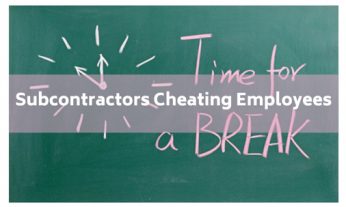 Contact a California breach of employment contract attorney if you feel the terms of your employment contract are not being honored. Contracts are entered into in the workplace every day. While many employees here in California are considered to be “at will” employees who can be terminated without cause, certain employees do have contracts that specify a particular time frame for work, and that may or may not have options for extensions. If you feel the terms of your contract are not being honored, you may wish to consult with an attorney experienced in such matters to determine how to proceed.
Contact a California breach of employment contract attorney if you feel the terms of your employment contract are not being honored. Contracts are entered into in the workplace every day. While many employees here in California are considered to be “at will” employees who can be terminated without cause, certain employees do have contracts that specify a particular time frame for work, and that may or may not have options for extensions. If you feel the terms of your contract are not being honored, you may wish to consult with an attorney experienced in such matters to determine how to proceed.
California Breach of Employment Contract Defined
What constitutes a California breach of employment contact? Several elements must exist:
- You and one or more parties must have entered into a contract;
- You substantially met the requirements set forth in the contract;
- If you did not complete all the requirements, you were reasonably excused from them;
- Your employer did not meet his or her requirements set forth in the contract, or;
- Your employer acted in a way that was prohibited within the contract;
- You experienced some harm;
- The harm was essentially due to the breach of contract.
What is a Material Breach?
A material breach is one that is so significant that it results in substantial damage, or it validates your reason for failing to fulfill your contractual obligations. For instance, let us say you contracted with an employer to redesign a web page and develop advertising materials over the course of one year. You were expecting to be paid monthly, but after three months you had yet to see a paycheck, or worse, you were let go. You are clearly justified in discontinuing your work because the failure to pay you as agreed for the established time period was a material breach.
What is a Non-Material Breach?
On the other hand, a non-material breach of contract generally involves only minor damage that would not entitle the other party to forgo their responsibilities of the contract. For instance, let us say you had agreed to redesign the web page and develop advertising materials by January 1st. Although you completed most of the job, the finished advertising materials were not available until January 4th. While you did fail to meet the terms of the contract, the damages to your employer are presumably minimal under the circumstances. Ergo, there is no justifiable reason for your wages to be withheld.
California Breach of Employment Contract – Damages
The types of damages recoverable include general damages and consequential damages.
- General damages are those that come directly out of the breach, such as wages for the job that was done.
- Consequential damages go beyond what might be expected due to the employment contract breach. For example, if the breach led to additional unforeseeable costs, they would be consequential damages.









